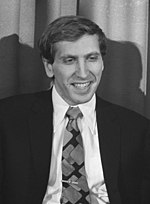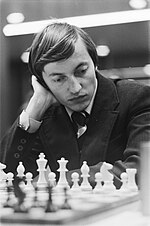World Chess Championship 1975
| Portraits | ||
|---|---|---|
| Bobby Fischer | Anatoly Karpov | |
| nation |
|
|
| status | Defending champion world champion since 1972 |
challenger |
| Age | 32 years | 24 years |
|
Elo rating (January 1975) |
2780 | 2705 |
The 1975 World Chess Championship was planned as a competition between the reigning world chess champion Bobby Fischer and his challenger Anatoly Karpov . After the world chess federation FIDE could not agree on the match conditions with Bobby Fischer, he refused to defend the title. On April 3, 1975, Fischer was therefore stripped of his title by FIDE President Max Euwe and Karpow was declared the new world chess champion.
The opponents
Bobby Fischer had only played two public games since winning the World Chess Championship in 1972 : an exhibition match against the Philippine President Ferdinand Marcos , which ended in a draw after eight moves, and a blitz game against the later FIDE President Florencio Campomanes , the Fischer by timeout won.
Karpov had qualified for the duel against Fischer by winning the candidates' tournament against Lev Polugajewski (5.5: 2.5), ex-world champion Boris Spasski (7: 4) and Viktor Korchnoi (12.5: 11.5). Since he did not appear later, the final of the Candidates Tournament is now considered a de facto decision for the world title. Already at the Candidates Tournament there were suspicions that Fischer would not defend his title.
The final of the Candidates Tournament, Karpov versus Korchnoi, was set to five wins, with a maximum duration of 24 games, after which the point better would win, and was played from September to November 1974 in Moscow. Karpow won the 2nd and 6th game because Korchnoi played too sharp. After a draw, Karpov managed another victory in the 17th game, after which rumors about a premature abandonment of the final by Korchnoi circumvented. However, he continued to play and won the 19th and 21st game, but was unable to equalize the score in the last three games.
Candidates tournament
| Quarter finals | Semifinals | final | |||||||||||
| |
5.5 (3) | ||||||||||||
| |
2.5 (0) | ||||||||||||
| |
7 (4) | ||||||||||||
| |
4 (1) | ||||||||||||
| |
4.5 (3) | ||||||||||||
| |
1.5 (0) | ||||||||||||
| |
12.5 (3) | ||||||||||||
| |
11.5 (2) | ||||||||||||
| |
7.5 (3) | ||||||||||||
| |
5.5 (1) | ||||||||||||
| |
3.5 (3) | ||||||||||||
| |
1.5 (1) | ||||||||||||
| |
7 (3) | ||||||||||||
| |
6 (2) | ||||||||||||
The table above shows the points and the victories in brackets. There were 16 games or 3 wins in the quarterfinals, 20 games or 4 wins in the semifinals and 24 games or 5 wins in the final. Petrosyan prematurely given up the duel against Korchnoi.
Course of the candidate competitions
- Quarter-finals Korchnoi - Mecking, January / February 1974 in Augusta (Georgia)
1 2 3 4th 5 6th 7th 8th 9 10 11 12 13 Points  Viktor Korchnoi
Viktor Korchnoi
½ ½ ½ ½ 1 ½ 1 ½ ½ ½ ½ 0 1 7½  Henrique Mecking
Henrique Mecking
½ ½ ½ ½ 0 ½ 0 ½ ½ ½ ½ 1 0 5½
- Quarter-finals Polugajewski - Karpov, January / February 1974 in Moscow
1 2 3 4th 5 6th 7th 8th Points  Lev Polugayevsky
Lev Polugayevsky
½ ½ ½ 0 ½ 0 ½ 0 2½  Anatoly Karpov
Anatoly Karpov
½ ½ ½ 1 ½ 1 ½ 1 5½
- Quarter-finals Petrosyan - Portisch, January / February 1974 in Palma
1 2 3 4th 5 6th 7th 8th 9 10 11 12 13 Points  Tigran Petrosian
Tigran Petrosian
½ ½ ½ ½ 1 ½ ½ ½ 1 0 ½ 0 1 7th  Lajos Portisch
Lajos Portisch
½ ½ ½ ½ 0 ½ ½ ½ 0 1 ½ 1 0 6th
- Quarterfinals Byrne - Spasski, January 1974 in San Juan (Puerto Rico)
1 2 3 4th 5 6th Points  Robert Byrne
Robert Byrne
½ ½ 0 0 ½ 0 1½  Boris Spassky
Boris Spassky
½ ½ 1 1 ½ 1 4½
- Semi-finals Korchnoi - Petrosyan, April 1974 in Odessa
1 2 3 4th 5 Points  Viktor Korchnoi
Viktor Korchnoi
1 ½ 1 0 1 3½  Tigran Petrosian
Tigran Petrosian
0 ½ 0 1 0 1½
- Semifinals Karpov - Spassky, April / May 1974 in Leningrad
1 2 3 4th 5 6th 7th 8th 9 10 11 Points  Anatoly Karpov
Anatoly Karpov
0 ½ 1 ½ ½ 1 ½ ½ 1 ½ 1 7th  Boris Spassky
Boris Spassky
1 ½ 0 ½ ½ 0 ½ ½ 0 ½ 0 4th
- Candidate finals Korchnoi - Karpow, September to November 1974 in Moscow
1 2 3 4th 5 6th 7th 8th 9 10 11 12 13 14th 15th 16 17th 18th 19th 20th 21st 22nd 23 24 Points  Viktor Korchnoi
Viktor Korchnoi
½ 0 ½ ½ ½ 0 ½ ½ ½ ½ ½ ½ ½ ½ ½ ½ 0 ½ 1 ½ 1 ½ ½ ½ 11½  Anatoly Karpov
Anatoly Karpov
½ 1 ½ ½ ½ 1 ½ ½ ½ ½ ½ ½ ½ ½ ½ ½ 1 ½ 0 ½ 0 ½ ½ ½ 12½
Fischer refused to show up
The competitions for the world chess championship from 1951 to 1972 were played in 24 games, with the world champion having retained his title at 12:12. In 1971 FIDE decided to instead play the 1975 World Chess Championship in six winning games with an unlimited number of games.
Fischer, on the other hand, had the idea of playing up to 10 winning games instead, whereby the world champion would keep his title at a score of 9: 9. Fred Cramer , President of the American Zone, first presented this position at the 1973 FIDE Congress. The proposed rule was criticized for the fact that the challenger had to win by two points (10: 8) in order to become the new world champion, and that this represented an undue disadvantage. A commission headed by FIDE President Max Euwe was set up to examine Fischer's proposal and spoke out against him.
At the FIDE congress in Nice in 1974 , Cramer read out a telegram from Fischer, according to which he adhered to his demands. With a narrow majority, the Congress decided to increase the number of required winning games to 10, but decided against the regulation that the world champion would keep his title at a score of 9: 9. In addition, the Congress limited the number of games to a maximum of 36. On the same evening, Euwe read out a new telegram from Fischer, in which he announced that his proposals were non-negotiable, that FIDE had decided against his participation in the 1975 World Chess Championship by rejecting it and that he resigned the title of FIDE World Chess Champion.
In January 1975 it was announced that the Philippines would be offering $ 5 million in prize funds for the World Championship fight. This was an enormous amount for the chess world; by 1969, the prize fund for world chess championships had been a maximum of $ 10,000. The Americans therefore made an attempt to save the World Cup fight: with the support of over 30% of the member federations, they forced an extraordinary FIDE congress to be held in Bergen in March 1975 . The Soviet Union wanted to prevent the rules from being changed. Immediately before the Congress, the leading Soviet chess grandmasters, including Efim Geller , Viktor Korchnoi , Tigran Petrosyan , Lev Polugayevsky and Mikhail Tal , signed an open letter to FIDE, which was printed in the Sovetsky Sport . The following day, Mikhail Botvinnik followed up with an open letter to the FIDE President in which he accused the FIDE President of favoring Fischer. At the Congress itself, Fischer's proposal was rejected by 35 to 32 votes, with the Third World voting in favor of the proposal and the Socialist and Western European countries voting against.
On April 1, 1975, the deadline expired by which Fischer and Karpow should declare their willingness to play the competition. Since he had not received a positive answer from Fischer, Euwe declared Anatoly Karpov to be the world chess champion on April 3, 1975.
consequences
Although Karpov had received the title without a fight, he was still considered a worthy successor to Fischer due to his subsequent victories in major tournaments. Karpov defended his title in 1978 and 1981 against Viktor Korchnoi. In 1985 he lost the title to Garry Kasparov .
In 1976, Fischer and Karpow met to discuss an unofficial duel, which however did not take place. For December 1996 the then FIDE President Kirsan Ilyumschinow planned another duel between Fischer and Karpow. In 1977 Fischer played several competitions against computers and in 1992 a duel against Boris Spasski. These remained his only serious games after winning the world title in 1972.
Individual references and sources
- ↑ a b Elo list from January 1975 on olimpbase.org, accessed on March 24, 2015
- ^ Garry Kasparov : On My Great Predecessors Part IV , p. 471.
- ^ Raymond Keene : History of the World Chess Championship . In: Kortschnoi and Pachman, pp. 14-19.
- ^ A b c Raymond Keene: Moscow 1974: Candidate Finals . In: Kortschnoi and Pachman, p. 45.
- ↑ mark-weeks.com: World Chess Championship 1973–75 Candidates Matches . Retrieved July 22, 2009
- ^ Garry Kasparov: On My Great Predecessors, Part IV, page 471 ff.
- ↑ Der Spiegel 16/1996, p. 188f
- ↑ Bill Wall: Bobby Fischer (1943–2008) ( Memento of January 22, 2008 in the Internet Archive ) (English), accessed on April 6, 2009
literature
- Michael Botwinnik : Karpov's competitions for the world championship. Rudi Schmaus, Heidelberg 1976.
- Viktor Kortschnoi and Luděk Pachman : World Chess Championship '78 . Walter Rau Verlag 1979. ISBN 3-7919-0175-3 .
Web links
- chessgames.com: Fischer vs FIDE, 1975: Fischer forfeits. (English)
- schachchronik.de: The withheld toy ( Memento from June 8, 2012 in the Internet Archive )

